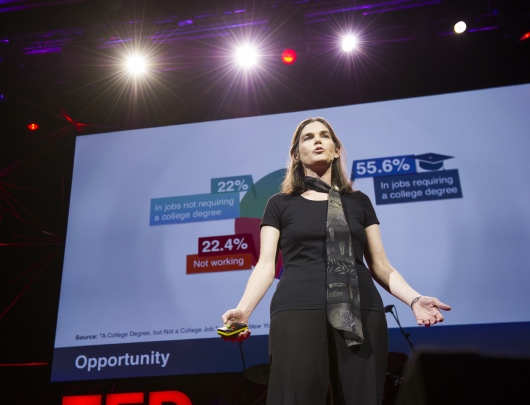It would cost you a minimum of $37,000 to enroll for a year at one of the top 10 schools in the United States, according to the U.S. News & World Report. However, anyone with a computer will now be able to take courses from half of those schools … for free.
At TEDGlobal 2012, Stanford University professor Daphne Koller introduced us to Coursera.org, an effort to bring rigorous college courses online to anyone who wants them. At the time, Coursera offered classes from Princeton University, the University of Michigan, Stanford University and the University of Pennsylvania. However, today, Coursera announced partnerships with seven more top colleges in the United States: California Institute of Technology, Duke University, Georgia Tech, the University of Virginia, Johns Hopkins Bloomberg School of Public Health, Rice University, the University of California San Francisco, the University of Washington, and the University of Illinois Urbana-Champaign.
At the same time, Caltech and the University of Pennsylvania have extended a combined $3.7 million investment in the site. And three international schools — the University of Edinburgh, the University of Toronto and Ecole Polytechnique Federale de Lausanne — have also signed agreements with Coursera.
When Koller spoke at TEDGlobal in late June, Coursera’s stats read as such: 680,000 students from 190 countries viewing 14 million videos and taking 6 million quizzes in 1.6 million course enrollments across 43 courses. However, with this new infusion, Coursera will now be offering about 111 classes.
Each class — and topics range from “Bioelectricity: A Quantitative Approach” to “Fantasy and Science Fiction: The Human Mind, Our Modern World” — has a definitive start date, and includes comprehension testing.
In her TEDTalk, Koller explained that Coursera was created after her Stanford colleague Andrew Ng offered a machine learning class online for free and had about 100,000 people enroll. But the benefits of the site go beyond offering great classes to anyone interested. By collecting every click, homework submission, quiz and forum note from tens of thousands of students, Coursera is a data mine that offers a new way to study learning.
“We can transform the study of human learning from hypothesis-driven to data-driven mode,” Koller explained.

Comments (81)
Pingback: NEW FREE online courses at Top Universities | CiteWire
Pingback: The Evolution of Medical Training | TechAlliance
Pingback: 12 great free online courses - Entrepreneur News | Australian Society of Entrepreneurs
Pingback: Mind Exercise? Try A Free Online MOOC | FrenchNewsOnline
Pingback: Student is a verb | Rebooting Me
Pingback: we successfully completed the design course - royby.com
Pingback: Internet Time Blog : Most popular posts about Working Smarter for July 2012
Pingback: Master Degree Computer Science Online
Pingback: Massive Online Education Puts Internet to a Good Use | The Quad bu student magazine & blog
Pingback: WTF ? HOW AWESOME ! Free Courses from Princeton or Stanford University. | me around
Pingback: 12 great free online courses | Insatiable Minds
Pingback: Radically Changing the Cost of Higher Education with Technology | SiliconANGLE
Pingback: Learning via Coursera | My So-Called Geek Girl LifeMy So-Called Geek Girl Life
Pingback: El futuro de la educación Online | User Experience Designers
Pingback: Online Courses Are Shaking Up College Education | HMH Current Events
Pingback: Free Android Development Course — NXTab.co.uk
Pingback: Internet Time Alliance | Most popular posts about Working Smarter for July 2012
Pingback: Statistics for translators: some resources and a free online course | Signs & Symptoms of Translation